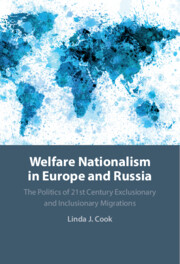 Welfare Nationalism in Europe and Russia
Welfare Nationalism in Europe and Russia The Broken Promise of Full Inclusion
from Part III - Exclusionary Migrations
Published online by Cambridge University Press: 14 November 2024
Chapter 5 turns to westward labor migration from the EU’s newly acceded Central and East European (CEE) states to the EU15 from 2004. Despite the EU’s promise full social inclusion, the migration followed an exclusionary cycle. Focusing on Britain, the chapter shows how migrants’ EU-mandated free entry and social rights provoked a welfare nationalist backlash that was amplified by the tabloid press and reflected in opinion polls and in growing support for the populist, anti-immigrant United Kingdom Independence Party (UKIP). Relying on government documents, the chapter shows how Britain’s social security bureaucracy progressively rescinded CEE labor migrants’ social rights while the government adopted exclusionary migration reforms, culminating in the 2016 Brexit vote that ended CEE migrants’ entry rights. The Brexit Settlement Scheme preserved residence rights for some on ethnically and economically discriminatory bases. Comparative case studies of CEE migration to Germany, Sweden, and Italy show that each followed the British model ‘part of the way,’ adopting more selective exclusionary policies that discriminated the poorer, younger and less-skilled. The conclusion explains why the EU failed in the effort to extend its egalitarian, inclusionary, European citizenship project eastward.
To save this book to your Kindle, first ensure no-reply@cambridge.org is added to your Approved Personal Document E-mail List under your Personal Document Settings on the Manage Your Content and Devices page of your Amazon account. Then enter the ‘name’ part of your Kindle email address below. Find out more about saving to your Kindle.
Note you can select to save to either the @free.kindle.com or @kindle.com variations. ‘@free.kindle.com’ emails are free but can only be saved to your device when it is connected to wi-fi. ‘@kindle.com’ emails can be delivered even when you are not connected to wi-fi, but note that service fees apply.
Find out more about the Kindle Personal Document Service.
To save content items to your account, please confirm that you agree to abide by our usage policies. If this is the first time you use this feature, you will be asked to authorise Cambridge Core to connect with your account. Find out more about saving content to Dropbox.
To save content items to your account, please confirm that you agree to abide by our usage policies. If this is the first time you use this feature, you will be asked to authorise Cambridge Core to connect with your account. Find out more about saving content to Google Drive.